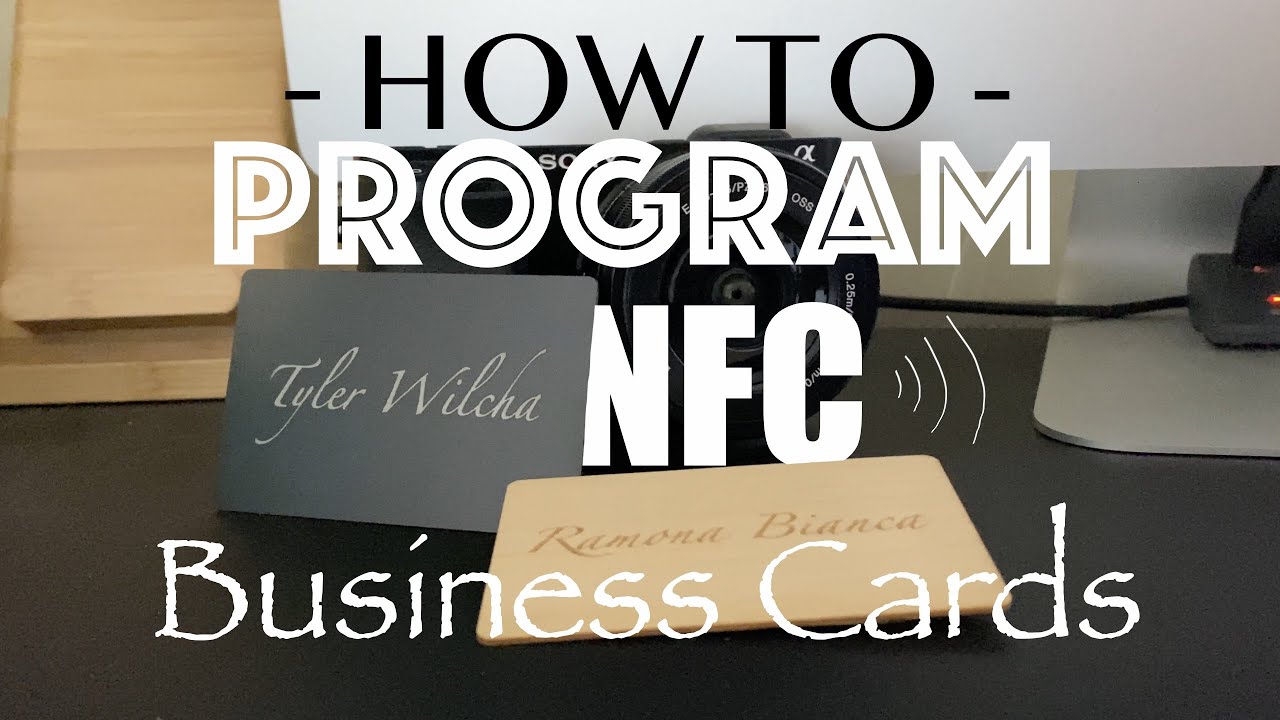Business
How do I program or update my NFC business card?

Introduction
In the age of digital transformation, the way we connect and network is evolving rapidly. Business cards, once made only of paper and ink, are now infused with powerful technology. NFC, or Near Field Communication, allows instant, contactless sharing of information. If you’ve recently gotten your hands on an NFC business card or are planning to, one essential skill you’ll want to learn is how to program or update the card with your information. Whether you’re a techie or a complete beginner, this guide will walk you through every step—simply, clearly, and confidently.
Understanding NFC Business Cards
NFC business cards may look like traditional cards, but they carry a tiny chip inside. This chip can be programmed to share any information you want with just a tap against a smartphone. It could be your contact details, your website, your LinkedIn profile, or even a downloadable file.
These cards are compatible with most modern smartphones, both Android and iOS. Once tapped, the card triggers an automatic action—usually opening a browser or a contact-saving screen. You don’t need internet for the tap to work, but if your link points to an online destination, the receiving phone will need a connection.
Why Programming Your NFC Card Matters
Programming your NFC business card turns it from a blank slate into a powerful tool. It makes networking faster, more memorable, and far more efficient. Instead of handing out dozens of traditional cards and hoping someone keeps them, one single NFC card can be used again and again, updated as your information changes.
If you’ve rebranded, changed roles, updated your website, or simply want to refine how people experience your card, learning how to program or update it puts that power directly in your hands. It also ensures your card is always current and aligned with your brand identity.
What You Need Before You Start
Before diving into the process, you’ll need a few things:
- First, make sure you have a writable NFC business card. Some cards come pre-programmed by manufacturers but allow updates. Others may be locked once written. Always confirm if your card supports rewrites.
- Second, you’ll need an NFC-enabled device, such as a smartphone or tablet. Most Android phones have built-in NFC support. For iPhone users, models from iPhone 7 onward generally include NFC, though you may need a specific app to write data.
- Third, download an NFC writing app. There are many available on app stores—NFC Tools, Smart NFC, or others recommended by your card provider.
- Lastly, decide what content you want to program into your card. This could be a URL, vCard (digital contact), social media profile, or custom message.
How the Programming Process Works
NFC chips work by wirelessly transmitting data to a compatible device within a short range—usually just a few centimeters. When you program your card, you’re essentially telling the chip what data to hold and how to respond when someone taps it with their phone.
The app you use will guide you through selecting the type of data, entering the content, and writing it to the chip. It’s not complicated—more like filling out a simple form. Once done, the data is stored on the chip and will remain there until overwritten.
Steps to Program a New NFC Business Card
Let’s walk through the actual programming process. After launching your NFC writing app, you’ll typically see a dashboard offering several data types to write URL, text, contact, app link, and more.
Choose the content type you want. For example, to direct people to your website, select “URL” and type in your site address. If you’re sharing contact info, pick the “Contact” or “vCard” option and input your details name, phone, email, company, and address.
Once your data is ready, tap “Write” or “Program” in the app. Then place your NFC card against the back of your phone as instructed. You’ll usually feel a vibration or see a confirmation message when the process is successful.
Don’t remove the card too quickly. Let the process finish completely. It takes only a few seconds, but a rushed attempt may corrupt the data or result in an incomplete write.
Updating an Existing NFC Business Card
The process for updating is very similar to the initial programming. However, one key step is to clear the existing data first. Most apps have an “Erase” or “Format” option. Use that to remove the old information before writing the new one.
Some apps also allow you to overwrite the data without formatting, especially if the card supports multiple rewrites. But formatting first can help avoid conflicts, especially if you’re switching data types—for example, from a website to a vCard.
After erasing, simply follow the same programming steps: select your new data, tap to write, and confirm it works by testing it on a smartphone.
Using Mobile Apps for Quick Setup
Mobile apps make programming NFC cards remarkably easy. Many of them have templates and automation features that allow you to save your preferences and apply them across multiple cards.
For instance, if you’re creating cards for your team, you can predefine a layout or contact structure and then fill in individual details per person. Some apps even sync with online databases or CRMs to pull info directly.
Apps like NFC Tools also offer advanced features like writing multiple records (e.g., website + social media), setting tags to open specific apps, or encoding Wi-Fi credentials. Explore these features as you become more comfortable.
What Kind of Data Can You Store
An NFC business card can carry many types of information. Most commonly, people store:
- Website URLs
- Digital business cards (vCards)
- Social media links (LinkedIn, Twitter, Instagram)
- Email addresses or prewritten messages
- Phone numbers for direct calling
- Calendar invites
- Download links for apps or portfolios
Some even store access codes, hotel check-in links, or Wi-Fi passwords for clients. However, NFC chips do have memory limits. Most business card chips hold between 144 to 888 bytes. So, keep your content short and focused.
Troubleshooting Common Issues
Sometimes, you may run into problems don’t worry, they’re usually easy to fix. If your phone doesn’t recognize the card, ensure NFC is turned on. On Android, it’s usually under “Connections” or “Settings > Wireless.” On iPhones, it’s on by default in most newer models.
If the write process fails, check if your card is locked or read-only. Some cheaper tags can only be written once. Try a different card or check if your app supports formatting.
Also, avoid placing metal objects or magnets near your NFC card when programming. These can interfere with the signal. If the link you programmed doesn’t open, double-check the URL format. Make sure it starts with “https://” for best compatibility.
Privacy and Security Considerations
When programming your NFC card, think carefully about privacy. Any NFC-enabled phone can read your card if it’s left unattended. That means you should avoid storing highly sensitive or personal data unless your card supports encryption (rare in standard business cards).
Also, keep URLs clean and professional. Avoid linking to platforms that require a login unless absolutely necessary. You want the user experience to be smooth, immediate, and trustworthy.
If you’re using a digital card service, ensure the provider uses HTTPS and allows you to control or disable the card remotely in case of loss or compromise.
Real-Life Scenarios and Use Cases
Imagine you’re attending a tech conference. Instead of handing out stacks of business cards, you offer your NFC card to each person you meet. With one tap, they have your contact info saved to their phone—no typos, no paper waste.
Or say you’re a real estate agent. You can use your NFC card to link directly to a virtual property tour, showing potential buyers your listings instantly.
If you’re in a creative field—like photography, design, or writing—you can link to your portfolio, making your first impression not just a handshake but a whole experience.
NFC Business Cards in a Professional World
Professionals across industries are adopting NFC cards not just for their novelty but for their functionality. They allow seamless integration between real-world encounters and digital identities.
Whether you’re a freelancer looking to stand out, a startup founder attending networking events, or a recruiter meeting potential hires, NFC business cards project a tech-savvy image while making interactions smoother.
Plus, they’re environmentally friendly, reducing the need for disposable paper cards. They also align with the values of modern branding—efficiency, innovation, and personalization.
Final Thoughts
Learning how to program or update your Digital Business Cards is a small investment of time that pays off in a big way. It empowers you to take full control of how you’re presented to the world. It allows your contact details to evolve as you grow professionally. And most importantly, it keeps you one step ahead in a world that’s rapidly embracing digital-first connections.
So go ahead pick up your NFC card, open the app, and start programming your future. The tap of a card may seem small, but it can open doors, forge connections, and leave lasting impressions in the digital age.
Business
Comme des Garçons: The Essence of Avant-Garde Fashion

If you’re on a quest for fashion that defies convention and worrying conditions the norms, look no similarly than Comme des Garçons. This avant-garde logo has captivated fashion fanatics round the sector with its specific aesthetic and boundary-pushing designs. Founded through manner of method of Rei Kawakubo in 1969, Comme des Garçons is extra than virtually clothing—it’s far a philosophy that encourages self-expression and creativity.
Whether you’re a seasoned collector or new to the world of immoderate fashion, knowledge this iconic label can redesign your fabric cupboard into a few issue absolutely extraordinary. Let’s dive deeper into what makes Comme des Garçons so specific and the manner you can choose quantities that resonate collectively in conjunction with your personal style.
The History of the Brand commesdesgarcons
Commes des Garçons emerged in 1969, primarily based totally through manner of method of the visionary style designer Rei Kawakubo in Tokyo. The logo short captured hobby with its avant-garde method to fashion. Kawakubo challenged conventional norms, growing quantities that blurred the lines amongst art work and utility.
Her designs often featured asymmetry, deconstruction, and a monochromatic palette. In the 1980s, CommesdesGarçons made waves internationally after debuting at Paris Fashion Week. It turn out to be proper right here that Kawakubo delivered her radical mind to a global audience. This technology marked a large shift in fashion, influencing limitless designers who followed. The logo have turn out to be synonymous with innovation and rebellion in competition to mainstream aesthetics.

The Philosophy behind commes des garcons
Commes des Garçons embodies an in depth method to fashion. Founded through manner of method of Rei Kawakubo in 1969, the logo worrying conditions conventional norms. It invites wearers to see clothing as art work in choice to mere cloth. Kawakubo’s philosophy emphasizes deconstruction and asymmetry. This creates quantities that often defy traditional silhouettes.
The goal is not virtually to dress but to provoke concept and emotion. Color palettes are deliberately muted or stark, enhancing the uniqueness of each design. Commes des Garçons encourages human beings to specific their identity boldly without conforming. The logo moreover embraces imperfection, celebrating flaws as part of beauty. Each item tells a story, inviting conversations about culture and society through fashion.
How to Choose the Perfect commesdesgarcons Piece
Choosing the appropriate Comme des Garçons piece is an thrilling journey. Start through manner of method of identifying your personal style. Are you drawn to avant-garde silhouettes or minimalist designs? Knowing what resonates with you can narrow down your options. Next, consider the match.
Comme des Garçons often plays with shapes and proportions, so trying items on is critical. A loose-turning into top might be a statement piece while tailored trousers can growth any outfit. Don’t neglect about approximately shadeation and pattern. The logo embraces bold prints and unconventional sun sunglasses that can make a strong impression.
Think about how the ones elements complement your gift fabric cupboard. The textures applied in Comme des Garçons collections can variety drastically—from gentle cottons to mounted wools—each supplying a totally specific vibe for any occasion. Enjoy exploring the severa worldwide of this iconic label!
Factors to Consider When Buying Commes des Garcons
When searching for Commes des Garçons, it’s far critical to consider your personal style. The logo is thought for its avant-garde designs that often mission traditional fashion norms. Sizing can be tricky. Each collection also can moreover have unique fits, so continuously take a look at the sizing chart or try items on if possible.
Quality is paramount. Look at the cloth and advent details; they replicate the craftsmanship on the lower back of each piece. Budget topics too. While making an funding in a statement item can growth your fabric cupboard, it’s far smart to balance splurge quantities with extra low priced options. Think about versatility.
Choose items that can with out troubles combo and match with extraordinary clothing in your fabric cupboard for max wearability. Keep a be careful for confined versions or collaborations. These specific quantities often grow to be collectors’ items over time and add great flair to any outfit.
Tips for Shopping at Commes des Garcons
Shopping at Comme des Garçons can be an interesting enjoy. It’s a journey into the avant-garde worldwide of fashion. Start through manner of method of exploring their large collections online. Familiarize yourself with unique lines, like PLAY or Homme Plus. Each has its specific vibe and aesthetic. Visit flagship stores if possible.
The layout often shows Rei Kawakubo’s current designs, supplying a sensory enjoy this is going beyond clothing. Don’t hesitate to try on quantities you’ll now no longer generally consider. The beauty of Comme des Garçons lies in breaking conventions and embracing individuality. Pay hobby to sizing; it could variety drastically at some point of collections. Check cross lower back pointers in advance than purchasing, specifically for online orders.
Embracing the Unique and Bold Style of Commes des Garcons
Embracing the perfect and bold style of Comme des Garçons manner stepping outdoor conventional fashion norms. The logo prospers on experimentation, hard traditional silhouettes and aesthetics. Each piece tells a story, often evoking emotions that byskip beyond mere clothing.
When you placed on Comme des Garçons, you’re now not virtually growing a fashion statement; you’re expressing individuality and creativity. This is an opportunity to reveal off your personal style in an actual manner. Mixing textures, patterns, and shapes can purpose surprising however stunning combinations. Don’t shrink back from bolder choices—encompass them! Whether it’s far oversized jackets or choppy designs, the ones quantities are designed to stand out.
Business
What Is the Masjid Sound System Price in Lahore Today?

A reliable sound system is one of the most important components of any mosque. From the Azaan to daily prayers, Jummah khutbah, and religious lectures, clear audio ensures that every worshipper can listen without difficulty. Many mosque committees and administrators often search for updated details about masjid sound system price in Lahore to plan installations or upgrades within their available budget.
Lahore, being a major metropolitan city, offers a wide variety of mosque audio systems. Whether you are setting up a small neighborhood masjid or equipping a large Jamia mosque, the total cost depends on equipment quality, wattage, number of speakers, amplifier capacity, and professional installation. Understanding these factors will help you make a smart and long-term investment.
Why Is a High-Quality Masjid Sound System Important?
A mosque sound system is not simply about loud volume. It is about delivering clear, distortion-free sound across indoor and outdoor spaces. Poor-quality equipment can cause echo, feedback noise, and uneven sound distribution, which may disturb worshippers during prayers.

Clear Azaan Transmission
Outdoor horn speakers are primarily used to broadcast the Azaan to surrounding areas. In a busy city like Lahore, powerful and weather-resistant speakers are necessary to ensure that the call to prayer is audible without harsh distortion.
Balanced Indoor Audio
Inside the mosque, column speakers or wall-mounted speakers distribute sound evenly throughout the prayer hall. This ensures that the Imam’s voice reaches the back rows clearly without creating uncomfortable noise levels.
Comfortable Listening Experience
A properly tuned system prevents excessive volume, echo, and audio feedback. A peaceful and clear sound environment enhances the spiritual experience for worshippers.
Masjid Sound System Price in Lahore – Current Market Overview
The cost of a mosque sound system in Lahore depends on multiple components including speakers, amplifiers, microphones, mixers, wiring, and installation services. Below is a general price estimate available in the local market.
Outdoor Horn Speakers
Horn speakers are installed on rooftops or minarets for long-distance sound projection.
- 30W to 50W horn speakers: PKR 4,000 – PKR 9,000
- 60W to 100W horn speakers: PKR 10,000 – PKR 22,000
- Heavy-duty imported horn speakers: PKR 22,000 – PKR 45,000+
These speakers are designed to withstand heat, dust, and rain.
Indoor Column Speakers
Column speakers provide even sound coverage inside the mosque.
- Basic column speakers: PKR 12,000 – PKR 25,000
- Premium column speakers: PKR 30,000 – PKR 75,000
Higher-end models offer superior voice clarity and reduced echo.
Amplifiers for Mosque Audio Systems
An amplifier powers and controls the speakers.
- 120W to 250W amplifiers: PKR 20,000 – PKR 50,000
- 300W to 500W amplifiers: PKR 50,000 – PKR 110,000
Modern amplifiers often include echo adjustment, equalizers, and multiple microphone inputs.
Microphones and Accessories
- Wired microphones: PKR 3,000 – PKR 12,000
- Wireless microphone systems: PKR 15,000 – PKR 50,000
- Mixer units and audio processors: PKR 25,000 – PKR 80,000
- Professional wiring and stands: PKR 15,000 – PKR 40,000
Complete Masjid Sound System Cost in Lahore
If you plan to install a full system including speakers, amplifier, microphones, mixer, wiring, and professional installation, the total estimated cost may range from:
- Small mosque setup: PKR 100,000 – PKR 200,000
- Medium mosque setup: PKR 300,000 – PKR 600,000
- Large Jamia mosque setup: PKR 700,000 – PKR 2,000,000+
The final price depends on mosque size, brand selection, and technical requirements.
Factors Affecting Masjid Sound System Prices in Lahore
Several important elements influence the overall cost.
Brand Reputation and Build Quality
Well-known audio brands typically offer better durability and clearer sound, which increases price. However, some local brands provide affordable and reliable alternatives.
Mosque Size and Architecture
Large prayer halls with high ceilings require more speakers and higher wattage amplifiers. Complex layouts may also require advanced sound planning.
Installation Complexity
Professional installation ensures proper speaker placement and wiring. Installation charges in Lahore can range from PKR 20,000 to PKR 80,000 depending on project size.
Imported vs Local Equipment
Imported sound systems are often more expensive due to currency exchange rates and shipping costs. However, they may offer advanced features and longer lifespan.
How to Choose the Best Masjid Sound System in Lahore?
Selecting the right system requires careful evaluation and expert guidance.
Conduct a Sound Assessment
Before purchasing, evaluate the mosque’s size, ceiling height, and layout. A professional sound technician can recommend the right number of speakers and amplifier capacity.
Use Separate Indoor and Outdoor Systems
Outdoor horn speakers should be dedicated to Azaan, while indoor column speakers handle sermons and prayers. This improves sound clarity and prevents distortion.
Focus on Sound Clarity Over Loudness
Excessive volume can create discomfort and echo. Choose equipment that provides crisp and balanced audio instead of simply high wattage.
Request a Live Demonstration
Ask suppliers in Lahore for a sound demo before finalizing your purchase. Testing ensures the equipment meets your expectations.
Benefits of Investing in a Professional Mosque Sound System
Installing a high-quality audio setup provides several long-term advantages:
- Clear and effective communication during prayers
- Enhanced spiritual atmosphere
- Reduced maintenance and repair costs
- Long-lasting equipment durability
- Improved community satisfaction
A well-installed sound system strengthens the mosque’s operations and creates a comfortable prayer environment.
Where to Buy Masjid Sound Systems in Lahore?
Lahore offers multiple options for purchasing mosque audio equipment. You can explore:
- Hall Road electronics market
- Professional audio equipment dealers
- Authorized distributors
- Online marketplaces offering delivery across Lahore
Before purchasing, compare prices, check warranty policies, and confirm after-sales service.
Maintenance Tips for Long-Term Performance
Proper maintenance ensures your mosque sound system performs efficiently for years.
- Clean outdoor speakers regularly to remove dust
- Inspect wiring connections periodically
- Use voltage stabilizers to protect equipment
- Schedule annual professional sound inspections
Regular maintenance reduces repair costs and extends equipment lifespan.
Conclusion
What is the masjid sound system price in Lahore, and which setup is best for your mosque? The answer depends on your mosque’s size, sound requirements, and available budget. Lahore’s market offers a wide range of options, from affordable basic systems to advanced professional installations for large Jamia mosques.
Investing in a high-quality mosque sound system ensures clear Azaan transmission, balanced indoor audio, and long-term reliability. By carefully assessing your needs and consulting experienced audio suppliers, you can select the ideal setup that provides a peaceful and comfortable spiritual experience for your community.
Business
Business Intelligence: Transforming Data into Strategic Insights

In today’s competitive landscape, organizations generate massive volumes of data from sales, marketing, operations, finance, and customer interactions. Yet, data alone does not create value. What truly matters is how effectively businesses turn that data into insights. A well-implemented business intelligence system enables companies to convert raw information into strategic decisions that drive measurable results.
Understanding the Foundation of Business Intelligence
At its core, a BI framework collects, integrates, analyzes, and visualizes data from multiple sources. Instead of relying on spreadsheets or fragmented reports, leaders gain a centralized view of performance metrics in real time. This clarity empowers departments to collaborate, align goals, and identify opportunities faster.
Many organizations often ask, how do business intelligence and business analytics support decision making? The answer lies in structured data analysis combined with predictive modeling. While business intelligence focuses on historical and real-time reporting, analytics digs deeper into trends, forecasting, and pattern recognition. Together, they create a powerful decision-support ecosystem.

Key Components of a Modern BI Environment
A robust BI framework typically includes:
- Data integration tools to consolidate information from various systems
- Data warehouses for structured storage
- Dashboards and visualization platforms
- Reporting tools for operational and strategic insights
- Security and governance controls
When these components work together, businesses move from reactive decision-making to proactive strategy development.
Why Organizations Need an Advanced BI Approach
Companies that depend on manual reporting often struggle with delays, inaccuracies, and inconsistent metrics. A centralized bi system eliminates these challenges by offering automated data processing and standardized reporting structures.
Here’s how modern BI transforms operations:
- Improved Visibility: Executives gain real-time insights into KPIs.
- Faster Reporting: Automated dashboards reduce dependency on IT teams.
- Better Forecasting: Historical data analysis improves future planning.
- Increased Accountability: Transparent metrics align teams with performance goals.
When implemented correctly, organizations clearly understand how business intelligence helps in decision making across departments, from finance to marketing.
The Role of Data-Driven Culture
Technology alone cannot guarantee success. Companies must foster a culture of data driven business intelligence, where decisions are supported by evidence rather than assumptions. This shift requires:
- Leadership commitment
- Employee training
- Accessible reporting tools
- Clear data governance policies
When employees trust the data and understand how to use it, adoption increases significantly. Teams begin to rely on insights rather than intuition.
Factors That Define Success
Several factors of business intelligence system implementation determine long-term success:
- Data accuracy and consistency
- Scalability of infrastructure
- User-friendly dashboards
- Strong security framework
- Integration capabilities with ERP and CRM platforms
Organizations that carefully evaluate these elements are more likely to build solutions that evolve with business growth.
Strategic Benefits Across Departments
A comprehensive BI environment delivers value to multiple business functions:
Finance Teams: Gain accurate revenue forecasting, expense monitoring, and profitability analysis.
Sales Teams: Track pipeline performance, identify conversion trends, and monitor customer behavior.
Marketing Departments: Measure campaign ROI, segment audiences effectively, and analyze engagement patterns.
Operations Managers: Monitor supply chain performance and identify inefficiencies.
These cross-functional insights enable alignment between short-term activities and long-term objectives.
Scalability and Future Readiness
As businesses grow, data volumes increase exponentially. Organizations must design effective business intelligence systems that scale without performance issues. Cloud-based infrastructure, flexible storage, and modular analytics tools ensure that BI platforms can handle expansion seamlessly.
Scalable BI solutions also support emerging technologies such as artificial intelligence and machine learning, enabling predictive insights and automated decision recommendations.
Real-World Applications
Companies across industries leverage BI for competitive advantage:
- Retailers analyze purchasing patterns to optimize inventory.
- Manufacturing firms monitor production efficiency and reduce downtime.
- Financial institutions assess risk exposure in real time.
- Healthcare providers track patient outcomes and operational metrics.
In each case, data becomes a strategic asset rather than a byproduct of operations.
Overcoming Common Challenges
Despite its benefits, BI implementation can face obstacles:
- Poor data quality
- Resistance to change
- Lack of executive sponsorship
- Inadequate training
To overcome these challenges, organizations must prioritize clear communication, stakeholder involvement, and phased deployment strategies. When users understand the business value, adoption improves significantly.
Measuring Return on Investment
The impact of BI is measurable. Key performance indicators may include:
- Reduced reporting time
- Increased revenue through optimized strategies
- Lower operational costs
- Improved customer retention
Tracking these metrics ensures continuous improvement and justifies technology investments.
Choosing the Right BI Partner
Selecting the right technology partner plays a crucial role in success. Businesses should evaluate vendors based on:
- Industry expertise
- Customization capabilities
- Integration flexibility
- Support and training services
- Proven implementation track record
A reliable partner ensures smoother deployment and long-term scalability.
The Future of Business Intelligence
The next generation of BI focuses on automation, artificial intelligence integration, and self-service analytics. Organizations will increasingly rely on predictive insights rather than descriptive reporting alone. Embedded analytics within operational systems will further streamline workflows.
As competition intensifies, companies that leverage intelligent data strategies will outperform those relying on outdated reporting methods.
Final Thoughts
In a data-saturated world, businesses cannot afford to operate without structured insights. A powerful BI framework empowers leaders to make faster, more accurate, and more strategic decisions. From improving operational efficiency to identifying new revenue opportunities, the benefits are transformative.
If your organization is ready to elevate its analytics capabilities and build a scalable, insight-driven environment, partnering with experts makes all the difference. Century Software helps businesses implement advanced intelligence solutions that drive measurable growth and long-term success.
-
Business3 years ago
Cybersecurity Consulting Company SequelNet Provides Critical IT Support Services to Medical Billing Firm, Medical Optimum
-
Business3 years ago
Team Communication Software Transforms Operations at Finance Innovate
-
Business3 years ago
Project Management Tool Transforms Long Island Business
-
Business3 years ago
How Alleviate Poverty Utilized IPPBX’s All-in-One Solution to Transform Lives in New York City
-
health3 years ago
Breast Cancer: The Imperative Role of Mammograms in Screening and Early Detection
-
Sports3 years ago
Unstoppable Collaboration: D.C.’s Citi Open and Silicon Valley Classic Unite to Propel Women’s Tennis to New Heights
-
Art /Entertainment3 years ago
Embracing Renewal: Sizdabedar Celebrations Unite Iranians in New York’s Eisenhower Park
-
Finance3 years ago
The Benefits of Starting a Side Hustle for Financial Freedom






























